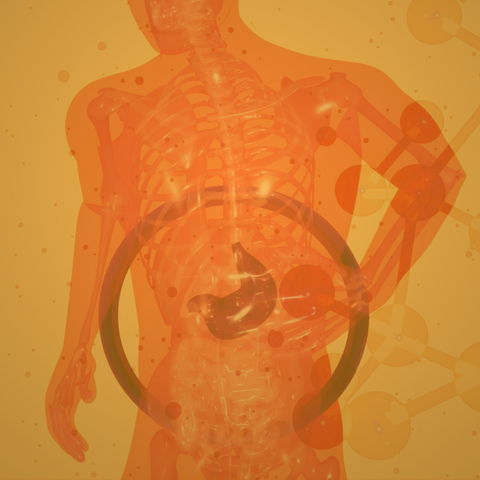
Your gut plays host to trillions of different microbes, comprising bacteria, fungi, archaea, and viruses, that together make up the gut microbiome [1,2]. It is the most abundant and diverse microbiota in the human body [3]. For decades, the scientific community thought these microbes simply aided digestion, but now we know that they communicate with the brain and the rest of the body. The bidirectional communication between the gut microbiome and the brain (sometimes called the microbiota-gut-brain axis [4]) helps explain why gut problems and mood changes so often occur together.
This article will explain the major ways that gut microbes produce and influence chemicals that shape mood and bowel function. It will also give concrete examples and note what this communication means for health and wellness.
Routes of Communication
Microbial chemicals influence the brain and gut in three intertwining ways. Firstly, neural signals travel via the vagus nerve and the enteric (gut) nervous system [5]. Second, microbes and their biochemical products modulate gut and systemic immune responses through cytokines (signaling molecules) that can affect brain function [6]. Microbes also make small molecules that enter the bloodstream or act locally on enterocytes and immune cells in the gut to change their physiology. As stated, these routes aren’t independent, and there is significant overlap between all these pathways. A simple cause-and-effect model is insufficient to explain the interactions and relationships within this complex system.
Short-Chain Fatty Acids (SCFAs)
When microbes ferment dietary fiber, they produce short-chain fatty acids (SCFAs), mainly acetate, propionate, and butyrate [7]. SCFAs represent one example of chemical communication between microbes and the host. SCFAs strengthen the gut barrier, regulate hormone and cytokine release by acting on enteroendocrine and immune cells, and stimulate enterochromaffin cells to release serotonin in the gut. In addition, they have the potential to regulate central nervous system activities through both direct and indirect means [8].
Given that SCFAs are produced from dietary fiber, the diet serves as a powerful lever to influence these signals. There is growing evidence tying altered SCFA profiles to mood disorders and to conditions like irritable bowel syndrome or IBS [9].
Microbially-Produced Neurotransmitters
Many gut microbes can manufacture neurotransmitters and their precursors [10,11]. Several Lactobacillus and Bifidobacterium species can make GABA by decarboxylating glutamate [12]. GABA is the main inhibitory neurotransmitter in the brain, and microbially produced GABA can act locally on the enteric nervous system and may influence vagal signaling to the brain [5]. If you're interested in learning more about GABA's role in gut health, read here.
Bacteria can also synthesize or alter precursors for dopamine, norepinephrine, and histamine, which affect gut motility, secretion, and immune responses. While the extent to which microbe-derived dopamine directly changes brain levels of dopamine is limited by physiological barriers, these compounds can strongly influence local gut function and signaling.
An important caveat to note is that microbially-produced neurotransmitters often act locally on the nerves, epithelial receptors, or immune cells. Their influence on mood is typically indirect in nature and occurs via vagal pathways, immune modulation, or by changing the availability of precursor molecules.
Microbial Chemistry and Bowel Health
The gut microbiota shape bowel function through a host of chemical mechanisms. Microbial metabolites such as SCFAs and serotonin from enterochromaffin cells alter smooth muscle activity and therefore gut motility. Changes in the microbial milieu can shift transit time, contributing to constipation or diarrhea [13]. Microbial products can also influence electrolyte and mucus secretion, which affects stool consistency, while also modulating gut barrier integrity and inflammation [14,15].
Practical Strategies for Gut Health
While the science continues to evolve, in general, the current evidence supports the consumption of fiber-rich foods to feed SCFA-producing microbes, as well as dietary diversification to foster microbial variety. If possible, antibiotics should be avoided unless deemed necessary by a physician, as antibiotics disrupt microbial communities [16,17].
Prebiotics and probiotics are pivotal in the regulation of the gut microbiota and its composition [18,19]. Prebiotics support beneficial bacteria and promote their growth, while probiotics facilitate balance within the microbiome itself. Probiotics, especially Lactobacillus and Bifidobacterium strains, may improve metabolic outcomes, such as glycemic control in diabetes. Although strain-specific effects should be considered, these supplements can be very useful in the promotion of gut health [19-21].
Conclusion
Gut microbes are chemical factories that produce SCFAs, neurotransmitters, and immune-activating components, among others, that influence gut motility, barrier integrity, and immune tone. Through these routes, they affect mood and behavior as well as overall gut health. The same molecules that shape how your gut moves and feels also help shape how your brain responds to stress and emotion. Dietary and lifestyle choices that nurture a diverse microbiome are currently the safest, most practical way to support both gut and mental health.
Check out some other blogs about your gut below:
References
[1] D.R. Wilson, L. Binford, S. Hickson, The Gut Microbiome and Mental Health, J Holist Nurs 42 (2024) 79–87. https://doi.org/10.1177/08980101231170487.
[2] G. Marano, S. Rossi, G. Sfratta, G. Traversi, F.M. Lisci, M.B. Anesini, R. Pola, A. Gasbarrini, E. Gaetani, M. Mazza, Gut Microbiota: A New Challenge in Mood Disorder Research, Life 15 (2025) 593. https://doi.org/10.3390/life15040593.
[3] Y. Han, B. Wang, H. Gao, C. He, R. Hua, C. Liang, S. Zhang, Y. Wang, S. Xin, J. Xu, Vagus Nerve and Underlying Impact on the Gut Microbiota-Brain Axis in Behavior and Neurodegenerative Diseases, JIR Volume 15 (2022) 6213–6230. https://doi.org/10.2147/JIR.S384949.
[4] S. Mörkl, M.I. Butler, S. Lackner, Advances in the gut microbiome and mood disorders, Current Opinion in Psychiatry 36 (2023) 1–7. https://doi.org/10.1097/YCO.0000000000000829.
[5] N. Faraji, B. Payami, N. Ebadpour, A. Gorji, Vagus nerve stimulation and gut microbiota interactions: A novel therapeutic avenue for neuropsychiatric disorders, Neuroscience & Biobehavioral Reviews 169 (2025) 105990. https://doi.org/10.1016/j.neubiorev.2024.105990.
[6] L. Müller, S. Di Benedetto, Bridging the brain and gut: neuroimmune mechanisms of neuroinflammation and therapeutic insights, Front. Cell. Neurosci. 19 (2025) 1590002. https://doi.org/10.3389/fncel.2025.1590002.
[7] W. Fusco, M.B. Lorenzo, M. Cintoni, S. Porcari, E. Rinninella, F. Kaitsas, E. Lener, M.C. Mele, A. Gasbarrini, M.C. Collado, G. Cammarota, G. Ianiro, Short-Chain Fatty-Acid-Producing Bacteria: Key Components of the Human Gut Microbiota, Nutrients 15 (2023) 2211. https://doi.org/10.3390/nu15092211.
[8] Y.P. Silva, A. Bernardi, R.L. Frozza, The Role of Short-Chain Fatty Acids From Gut Microbiota in Gut-Brain Communication, Front. Endocrinol. 11 (2020) 25. https://doi.org/10.3389/fendo.2020.00025.
[9] W. Jiang, J. Wu, S. Zhu, L. Xin, C. Yu, Z. Shen, The Role of Short Chain Fatty Acids in Irritable Bowel Syndrome, J Neurogastroenterol Motil 28 (2022) 540–548. https://doi.org/10.5056/jnm22093.
[10] A. Mhanna, N. Martini, G. Hmaydoosh, G. Hamwi, M. Jarjanazi, G. Zaifah, R. Kazzazo, A. Haji Mohamad, Z. Alshehabi, The correlation between gut microbiota and both neurotransmitters and mental disorders: A narrative review, Medicine 103 (2024) e37114. https://doi.org/10.1097/MD.0000000000037114.
[11] S. Miri, J. Yeo, S. Abubaker, R. Hammami, Neuromicrobiology, an emerging neurometabolic facet of the gut microbiome?, Front. Microbiol. 14 (2023) 1098412. https://doi.org/10.3389/fmicb.2023.1098412.
[12] P. Strandwitz, K.H. Kim, D. Terekhova, J.K. Liu, A. Sharma, J. Levering, D. McDonald, D. Dietrich, T.R. Ramadhar, A. Lekbua, N. Mroue, C. Liston, E.J. Stewart, M.J. Dubin, K. Zengler, R. Knight, J.A. Gilbert, J. Clardy, K. Lewis, GABA-modulating bacteria of the human gut microbiota, Nat Microbiol 4 (2018) 396–403. https://doi.org/10.1038/s41564-018-0307-3.
[13] M.A. Iancu, M. Profir, O.A. Roşu, R.F. Ionescu, S.M. Cretoiu, B.S. Gaspar, Revisiting the Intestinal Microbiome and Its Role in Diarrhea and Constipation, Microorganisms 11 (2023) 2177. https://doi.org/10.3390/microorganisms11092177.
[14] N. Di Tommaso, A. Gasbarrini, F.R. Ponziani, Intestinal Barrier in Human Health and Disease, IJERPH 18 (2021) 12836. https://doi.org/10.3390/ijerph182312836.
[15] A.M. Kocot, E. Jarocka-Cyrta, N. Drabińska, Overview of the Importance of Biotics in Gut Barrier Integrity, IJMS 23 (2022) 2896. https://doi.org/10.3390/ijms23052896.
[16] J. Ramirez, F. Guarner, L. Bustos Fernandez, A. Maruy, V.L. Sdepanian, H. Cohen, Antibiotics as Major Disruptors of Gut Microbiota, Front. Cell. Infect. Microbiol. 10 (2020) 572912. https://doi.org/10.3389/fcimb.2020.572912.
[17] W.E. Anthony, B. Wang, K.V. Sukhum, A.W. D’Souza, T. Hink, C. Cass, S. Seiler, K.A. Reske, C. Coon, E.R. Dubberke, C.-A.D. Burnham, G. Dantas, J.H. Kwon, Acute and persistent effects of commonly used antibiotics on the gut microbiome and resistome in healthy adults, Cell Reports 39 (2022) 110649. https://doi.org/10.1016/j.celrep.2022.110649.
[18] S.-K. Kim, R.B. Guevarra, Y.-T. Kim, J. Kwon, H. Kim, J.H. Cho, H.B. Kim, J.-H. Lee, Role of Probiotics in Human Gut Microbiome-Associated Diseases, Journal of Microbiology and Biotechnology 29 (2019) 1335–1340. https://doi.org/10.4014/jmb.1906.06064.
[19] S. Saedi, S. Derakhshan, A. Hasani, M. Khoshbaten, V. Poortahmasebi, P.G. Milani, J. Sadeghi, Recent Advances in Gut Microbiome Modulation: Effect of Probiotics, Prebiotics, Synbiotics, and Postbiotics in Inflammatory Bowel Disease Prevention and Treatment, Curr Microbiol 82 (2025) 12. https://doi.org/10.1007/s00284-024-03997-y.
[20] P. Chandrasekaran, S. Weiskirchen, R. Weiskirchen, Effects of Probiotics on Gut Microbiota: An Overview, IJMS 25 (2024) 6022. https://doi.org/10.3390/ijms25116022.
[21] P.M. Bock, A.F. Martins, B.D. Schaan, Understanding how pre- and probiotics affect the gut microbiome and metabolic health, American Journal of Physiology-Endocrinology and Metabolism 327 (2024) E89–E102. https://doi.org/10.1152/ajpendo.00054.2024.





Comments (0)
There are no comments for this article. Be the first one to leave a message!